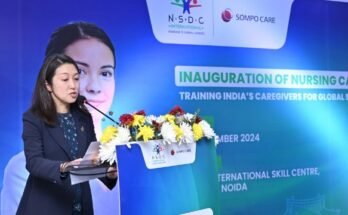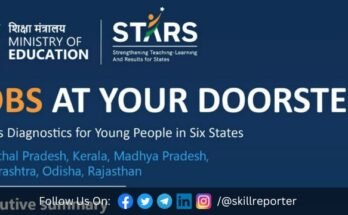In the 75th year of India’s Independence, the World has recognized the Indian Economy as a ‘bright star’ as the Economic Growth is estimated at 7 per cent, which is the highest among all major economies, in spite of the massive global slowdown caused by COVID-19 and Russia-Ukraine War. This was stated by Union Minister for Finance & Corporate Affairs Smt. Nirmala Sitharaman, while presenting the Union Budget 2023-24 in Parliament today. She emphasized that Indian economy is on the right track, and despite a time of challenges, heading towards a bright future.
Union Budget 2023 presents vision for Amrit Kaal – Blue print for an empowered and inclusive economy which is not possible without the education and skilling improvements. Here’s all what you need to know about Education and Skill Development from this budget.
Aspirational Districts and Blocks Programme
Building on the success of the Aspirational Districts Programme, the Government has recently launched the Aspirational Blocks Programme covering 500 blocks for saturation of essential government services across multiple domains such as health, nutrition, education, agriculture, water resources, financial inclusion, skill development, and basic infrastructure.
PMKVY 4.0
Pradhan Mantri Kaushal Vikas Yojana 4.0 will be launched to skill lakhs of youth within the next three years. On-job training, industry partnership, and alignment of courses with needs of industry will be emphasized. The scheme will also cover new age courses for Industry 4.0 like coding, AI, robotics, mechatronics, IOT, 3D printing, drones, and soft skills.
To skill youth for international opportunities, 30 Skill India International Centres will be set up across different States.
Skill India Digital Platform
The digital ecosystem for skilling will be further expanded with the launch of a unified Skill India Digital platform for:
- enabling demand-based formal skilling,
- linking with employers including MSMEs, and
- facilitating access to entrepreneurship schemes.
National Apprenticeship Promotion Scheme
Direct Benefit Transfer under a pan-India National Apprenticeship Promotion Scheme will be rolled out to provide stipend support to 47 lakh youth in three years
PM VIshwakarma KAushal Samman (PM VIKAS)
For centuries, traditional artisans and craftspeople, who work with their hands using tools, have brought renown for India. They are generally referred to as Vishwakarma. The art and handicraft created by them represents the true spirit of Atmanirbhar Bharat.
For the first time, a package of assistance for them has been conceptualized. The new scheme will enable them to improve the quality, scale and reach of their products, integrating them with the MSME value chain. The components of the scheme will include not only financial support but also access to advanced skill training, knowledge of modern digital techniques and efficient green technologies, brand promotion, linkage with local and global markets, digital payments, and social security. This will greatly benefit the Scheduled Castes, Scheduled Tribes, OBCs, women and people belonging to the weaker sections.
Pradhan Mantri PVTG Development Mission
To improve socio-economic conditions of the particularly vulnerable tribal groups (PVTGs), Pradhan Mantri PVTG Development Mission will be launched. This will saturate PVTG families and habitations with basic facilities such as safe housing, clean drinking water and sanitation, improved access to education, health and nutrition, road and telecom connectivity, and sustainable livelihood opportunities. An amount of Rs 15,000 crore will be made available to implement the Mission in the next three years under the Development Action Plan for the Scheduled Tribes.
Eklavya Model Residential Schools
In the next three years, centre will recruit 38,800 teachers and support staff for the 740 Eklavya Model Residential Schools, serving 3.5 lakh tribal students.
Teachers Training
Teachers’ training will be re-envisioned through innovative pedagogy, curriculum transaction, continuous professional development, dipstick surveys, and ICT implementation. She added that the District Institutes of Education and Training will be developed as vibrant institutes of excellence for this purpose.
National Digital Library for Children and Adolescents
A National Digital Library for children and adolescents will be set-up for facilitating availability of quality books across geographies, languages, genres and levels, and device agnostic accessibility.
States will be encouraged to set up physical libraries for them at panchayat and ward levels and provide infrastructure for accessing the National Digital Library resources.
Additionally, to build a culture of reading, and to make up for pandemic-time learning loss, the National Book Trust, Children’s Book Trust and other sources will be encouraged to provide and replenish noncurricular titles in regional languages and English to these physical libraries.
Collaboration with NGOs that work in literacy will also be a part of this initiative. To inculcate financial literacy, financial sector regulators and organizations will be encouraged to provide age-appropriate reading material to these libraries.
Centres of Excellence for Artificial Intelligence
The Finance Minister said that for realizing the vision of “Make A-I in India and Make A-I work for India”, three centers of excellence for Artificial Intelligence will be set-up in top educational institutions. Leading industry players will partner in conducting interdisciplinary research, develop cutting-edge applications and scalable problem solutions in the areas of agriculture, health, and sustainable cities, which will galvanize an effective A-I ecosystem and nurture quality human resources in the field.
Youth Power
To empower the youth and help the ‘Amrit Peedhi’ realize their dreams, Government has formulated the National Education Policy, focused on skilling, adopted economic policies that facilitate job creation at scale, and have supported business opportunities.
Nursing Colleges
One hundred and fifty-seven new nursing colleges will be established in co-location with the existing 157 medical colleges established since 2014.
Other in Learning
Mission Karmayogi
Under Mission Karmayogi, Centre, States and Union Territories are making and implementing capacity-building plans for civil servants. The government has also launched an integrated online training platform, iGOT Karmayogi, to provide continuous learning opportunities for lakhs of government employees to upgrade their skills and facilitate people-centric approach.
Skill Development in Tourism
Sector specific skilling and entrepreneurship development will be dovetailed to achieve the objectives of the ‘Dekho Apna Desh’ initiative.
Capacity Building in Securities Market
To build capacity of functionaries and professionals in the securities market, SEBI will be empowered to develop, regulate, maintain and enforce norms and standards for education in the National Institute of Securities Markets and to recognize award of degrees, diplomas and certificates.
Reclaiming of shares and dividends
For investors to reclaim unclaimed shares and unpaid dividends from the Investor Education and Protection Fund Authority with ease, an integrated IT portal will be established.
Medical Research
Facilities in select ICMR Labs will be made available for research by public and private medical college faculty and private sector R&D teams for encouraging collaborative research and innovation.
Multidisciplinary courses for medical devices
Dedicated multidisciplinary courses for medical devices will be supported in existing institutions to ensure availability of skilled manpower for futuristic medical technologies, high-end manufacturing and research.
Some more points to note:
- The rate of TCS for foreign remittances for education is proposed to continue to be 5 per cent for remittances in excess of INR 7 lakh. Similarly, the rate of TCS on foreign remittances for the purpose of education through loan from financial institutions is proposed to continue to be 0.5 percent in excess of INR7 lakh.
- National Data Governance Policy to be brought out to unleash innovation and research by academia.
- A unified Skill India Digital platform to be launched for enabling demand-based formal skilling, linking with employers including MSMEs, and facilitating access to entrepreneurship schemes.



